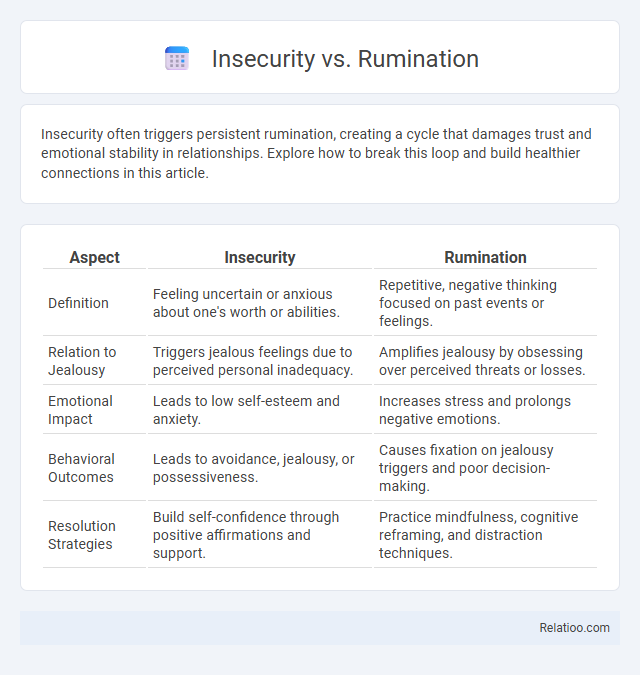Insecurity often triggers persistent rumination, creating a cycle that damages trust and emotional stability in relationships. Explore how to break this loop and build healthier connections in this article.
Table of Comparison
| Aspect | Insecurity | Rumination |
|---|---|---|
| Definition | Feeling uncertain or anxious about one's worth or abilities. | Repetitive, negative thinking focused on past events or feelings. |
| Relation to Jealousy | Triggers jealous feelings due to perceived personal inadequacy. | Amplifies jealousy by obsessing over perceived threats or losses. |
| Emotional Impact | Leads to low self-esteem and anxiety. | Increases stress and prolongs negative emotions. |
| Behavioral Outcomes | Leads to avoidance, jealousy, or possessiveness. | Causes fixation on jealousy triggers and poor decision-making. |
| Resolution Strategies | Build self-confidence through positive affirmations and support. | Practice mindfulness, cognitive reframing, and distraction techniques. |
Understanding Insecurity and Rumination
Insecurity often stems from deep-seated self-doubt and fear of judgment, leading to fluctuating confidence levels, while rumination involves repetitive, negative thought patterns focused on past events or perceived failures. Understanding insecurity requires recognizing its emotional triggers and how it can distort self-perception, whereas managing rumination involves interrupting unproductive cycles of overthinking to improve mental clarity. Your awareness of these differences empowers you to develop healthier coping strategies that enhance emotional resilience and well-being.
Defining Insecurity: Causes and Manifestations
Insecurity stems from deep-rooted fears of inadequacy and rejection, often triggered by low self-esteem, past traumas, or negative social comparisons. Manifestations include persistent self-doubt, anxiety, and hypersensitivity to criticism, which can impair personal and professional relationships. Unlike rumination, which involves repetitive negative thinking about past events, insecurity primarily centers on feelings of unworthiness and vulnerability in present contexts.
Decoding Rumination: Patterns and Effects
Rumination involves repetitive, passive focus on negative thoughts, often intensifying feelings of insecurity and emotional distress. Your mind can become trapped in patterns of overthinking, which impairs decision-making and heightens anxiety. Decoding rumination requires identifying triggers and thought loops to effectively interrupt these cycles and promote mental clarity.
Key Differences between Insecurity and Rumination
Insecurity is a persistent feeling of self-doubt and lack of confidence, often rooted in fear of judgment or failure, whereas rumination involves repetitive, intrusive thoughts focused on past events or potential problems. Insecurity primarily affects one's self-esteem and emotional stability, while rumination exacerbates stress and anxiety by continuously analyzing negative experiences without resolution. Understanding these key differences is crucial for targeting cognitive-behavioral interventions that improve mental health outcomes.
How Insecurity Fuels Rumination
Insecurity acts as a catalyst for rumination by intensifying self-doubt and persistent negative thinking. When individuals feel uncertain about their worth or decisions, their minds repeatedly cycle through worries and hypothetical scenarios. This mental loop exacerbates anxiety and hinders emotional resilience, creating a feedback loop where insecurity fuels continuous rumination.
Psychological Impact: Insecurity vs. Rumination
Insecurity often triggers heightened anxiety and diminished self-esteem, leading Your mind to focus on perceived personal flaws and social rejection. Rumination, characterized by repetitive negative thinking, exacerbates emotional distress by keeping problems unresolved and amplifying feelings of helplessness. Both insecurity and rumination contribute to psychological challenges such as depression and impaired decision-making, but rumination intensifies cognitive load, prolonging negative emotional states.
Identifying Root Causes of Insecurity
Identifying root causes of insecurity involves examining patterns of rumination, where repetitive negative thoughts amplify feelings of self-doubt and vulnerability. You can break this cycle by recognizing how rumination intensifies insecurities, often stemming from past experiences or unmet emotional needs. Addressing these underlying issues helps build resilience and fosters a healthier self-perception.
Breaking the Cycle of Rumination
Breaking the cycle of rumination involves shifting focus from repetitive negative thoughts to actionable problem-solving strategies that enhance emotional regulation. Cognitive-behavioral techniques, mindfulness practices, and grounding exercises help disrupt insecurity-driven rumination patterns by fostering present-moment awareness and self-compassion. Consistently applying these methods reduces the intensity of intrusive thoughts and promotes mental resilience.
Strategies to Manage Insecurity and Rumination
Managing insecurity and rumination involves cognitive-behavioral techniques such as mindfulness and cognitive restructuring to challenge negative thought patterns. Implementing grounding exercises and journaling can redirect focus from repetitive worries toward present-moment awareness and self-reflection. Consistent practice of these strategies enhances emotional regulation and reduces the intensity of insecurity and ruminative cycles.
Building Resilience: Steps Toward Emotional Wellbeing
Building resilience involves recognizing the detrimental effects of insecurity and rumination on emotional wellbeing. Developing strategies such as cognitive reframing, mindfulness practices, and emotional regulation helps interrupt negative thought patterns and fosters mental strength. Consistent application of these steps enhances adaptive coping mechanisms, promoting sustained emotional balance and psychological growth.

Infographic: Insecurity vs Rumination
 relatioo.com
relatioo.com